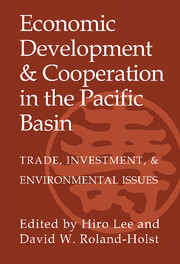 Economic Development and Cooperation in the Pacific Basin
Economic Development and Cooperation in the Pacific Basin Book contents
- Frontmatter
- Contents
- Acknowledgments
- List of Contributors
- I Introduction and Overview
- II U.S.-Japan and Asian Trade Patterns
- III Regional Trading Arrangements in the Pacific Basin
- IV Foreign Direct Investment: Determinants and Consequences
- 7 The Determinants of Foreign Direct Investment: A Survey with Applications to the United States
- 8 Are Trade and Direct Investment Substitutes or Complements? An Empirical Analysis of Japanese Manufacturing Industries
- 9 Korea's Outward Foreign Direct Investment and the Division of Labor in the Asia-Pacific
- 10 China's Absorption of Foreign Direct Investment
- 11 The Impact of Foreign Investment in Indonesia: Historical Trends and Simulation Analysis
- V Trade, Resources, and the Environment
- Index
8 - Are Trade and Direct Investment Substitutes or Complements? An Empirical Analysis of Japanese Manufacturing Industries
Published online by Cambridge University Press: 19 May 2010
- Frontmatter
- Contents
- Acknowledgments
- List of Contributors
- I Introduction and Overview
- II U.S.-Japan and Asian Trade Patterns
- III Regional Trading Arrangements in the Pacific Basin
- IV Foreign Direct Investment: Determinants and Consequences
- 7 The Determinants of Foreign Direct Investment: A Survey with Applications to the United States
- 8 Are Trade and Direct Investment Substitutes or Complements? An Empirical Analysis of Japanese Manufacturing Industries
- 9 Korea's Outward Foreign Direct Investment and the Division of Labor in the Asia-Pacific
- 10 China's Absorption of Foreign Direct Investment
- 11 The Impact of Foreign Investment in Indonesia: Historical Trends and Simulation Analysis
- V Trade, Resources, and the Environment
- Index
Summary
INTRODUCTION
Interdependence among countries has increased substantially since the end of World War II. The main force behind this growing interdependence is international trade. Indeed, it is the rapid expansion in world trade, resulting largely from liberalization of manufacturing trade, that has led to substantial growth of the world economy. In recent years, however, foreign direct investment (FDI) has become a major contributor to deepening interdependence among countries. Between 1980 and 1996, world FDI grew at an annual average rate of 12.6 percent, significantly higher than the corresponding growth rate of 6.5 percent for world trade (both in nominal terms).
Rapid FDI expansion has given rise to an important and interesting question regarding the relationship between FDI and international trade. Does international trade promote or discourage FDI? Does FDI facilitate or restrict international trade? These questions concern whether FDI and trade are complements or substitutes (i.e., whether they exert positive or negative influences on each other).
Theoretically, FDI and trade can be either complements or substitutes. Within the framework of the Heckscher-Ohlin (H-O) model, Mundell (1957) showed that FDI and trade are perfect substitutes; in other words, trade reduces incentives for FDI and vice versa. In contrast, by relaxing the assumptions used in the H-O model, Markusen (1983) obtained a case where FDI and trade can be complements. Specifically, he demonstrated that FDI expands trade when trade is induced by non-H-O factors, such as differences in technologies between trading partners. A crucial determinant of this relationship is whether FDI is undertaken in an export industry or import-competing industry in the host country.
- Type
- Chapter
- Information
- Economic Development and Cooperation in the Pacific BasinTrade, Investment, and Environmental Issues, pp. 251 - 296Publisher: Cambridge University PressPrint publication year: 1998
- 13
- Cited by


